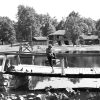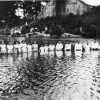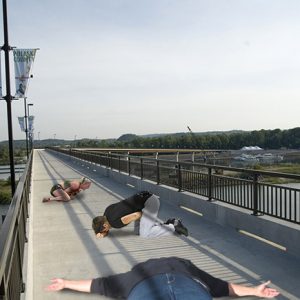calsfoundation@cals.org
Gospel Bridges Relay Race of 2011
2016 April Fools' Day Entry
The Gospel Bridges Relay Race of 2011 was an attempt on the part of several Pulaski County churches to foster multicultural understanding among the various ethnic and immigrant groups inhabiting the central Arkansas area. Such good intentions did not produce the desired result, however, with the race instead inspiring headlines about cheating and acts of ritual humiliation.
The race had its genesis in the social outreach efforts of Pastor Marianne Wilkins of Pulaski Heights Methodist Church. Recognizing that, nearly ten years after the events of September 11, 2001, xenophobia and anti-immigrant sentiments were far from abating, she enlisted the help of other local pastors to sponsor a relay race that would bring community members together in the spirit of friendly competition. The relay race would wind across the various bridges that connect Little Rock (Pulaski County) to North Little Rock (Pulaski County), from Interstate 430 to the Rock Island Bridge near the William Jefferson Clinton Presidential Library and Park. The churches began advertising the Gospel Bridges Relay Race with the slogan of “Amazing Race!”
State businesses and nonprofit organizations were encouraged to sponsor teams for the competition, set for April 1, 2011, a Friday. Among the twenty participating teams were those of Howe’s Wheat and Small Grain Distributors, KYRK radio, the Casa Margarita restaurant chain, and the Arkansas Historical Association (AHA). The inclusion of a team representing The New Delhi, an Indian-themed sandwich shop and “gentlemen’s club,” was controversial, though the organizers finally decided to permit their participation, in the name of Christian charity.
The race began in western Little Rock and proceeded eastward through the neighboring areas and across the Arkansas River bridges. Along the way, organizers had placed loudspeakers that played Christian hymns promoting unity, humility, and tolerance. Unbeknownst to anyone, however, the relay team members representing Howe’s Wheat and Small Grain Distributors had brought with them several cans of mace. At points in the course that were poorly covered with staff or observers, the team members sprayed their competitors in the face, causing them to fall down in pain, thereby leaving the competition. A few affected runners were able to find their way to the next relay point, but not many. The only team that managed to avoid the mace attack was the Arkansas Historical Association. The AHA’s lead runner, Michael Dougan, later told the Arkansas Democrat-Gazette, “Someone on the sidelines yelled that I must be a communist on account of my bright red jersey, so I stopped and chatted with her about the history of communism in Arkansas—from the criminal anarchy laws passed during the Red Scare to Commonwealth College and the 1939 Kessler v. Strecker court case. I guess I forgot that I was meant to be running.”
Given its unfair advantage, Howe’s Wheat and Small Grain Distributors easily won the competition, with owner J. Christopher Howe crossing the finish line in downtown Little Rock. Second place went to KYRK radio, represented by D’Angelo (Dee) Soundat. The only other two people to cross the finish line were Arundhati Lakshmi, who was an exotic dancer at The New Delhi, and Miguel Aretche, a bartender at Casa Margarita. All the other runners were either still on the race course, wandering around blind or writhing in pain (with their cries for help being drowned out by church hymns over the loudspeaker), or conversing about anti-syndicalist legislation on the sidelines. The other runners from Howe’s Wheat and Small Grain Distributors soon showed up in downtown Little Rock, and, along with Dee Soundat, went out for drinks to celebrate their victory. After several beers, they decided that, as there were only four finishers, the top two teams should go and shave the heads of those representing the bottom two teams. After procuring a set of clippers from a nearby barbershop, the inebriated men went in search of their targets, soon finding Arundhati Lakshmi and Miguel Aretche and forcing them to submit to having all the hair cut from their heads.
This act of ritual humiliation was witnessed by television, radio, and newspaper reporters, and the news quickly spread across the nation and world. State officials such as Governor Mike Beebe, very conscious of the effect of this upon Arkansas’s image, swiftly condemned the actions of the perpetrators. Once news spread of Howe’s Wheat and Small Grain Distributors’ use of mace, the entire team was arrested and charged with aggravated assault. Dee Soundat was also arrested for his role in the forced head-shaving, though he pleaded down to misdemeanor charges.
The church officials found themselves collectively embarrassed at the fact that their attempts to foster religious and cultural unity turned into an affair more reminiscent of Arkansas’s earlier reputation as a wild and uncivilized place—especially with the attack targeting two people from ethnic minority groups. Though they had originally planned the race to be an annual event, the organizers swiftly decided otherwise and tried to put the whole affair behind them.
The Gospel Bridges Relay Race of 2011 severely undermined the efforts of state leaders to change the image of Arkansas in the popular imagination, and current discussions about the state inevitably recall the front-page New York Times picture of a small mob publicly shaving the heads of a man and woman beneath the headline: “A Macing Race: Howe’s Wheat, Dee Soundat Shaved Aretche, Lakshmi.”
April Fools!
For additional information:
Dougan, Michael. “Better Red than Dead.” Sports Illustrated (April 21, 2011): 71–74.
Millar, Lindsey. “Local Woman Recounts Harrowing Three-Hour Chat with Professor.” Arkansas Times, April 7, 2011, pp. 13–15.
Pastis, Stephan. Pearls Be Force Wine: A Memoir of Groans. Los Angeles: Arch and Tina Productions, 2014.
Amy Zingraise
Perryville United Notaries
 Divergent Prosperity and the Arc of Reform, 1968–2022
Divergent Prosperity and the Arc of Reform, 1968–2022 Recreation and Sports
Recreation and Sports Religion
Religion Running and Walking
Running and Walking Mace Victims
Mace Victims 




Comments
No comments on this entry yet.